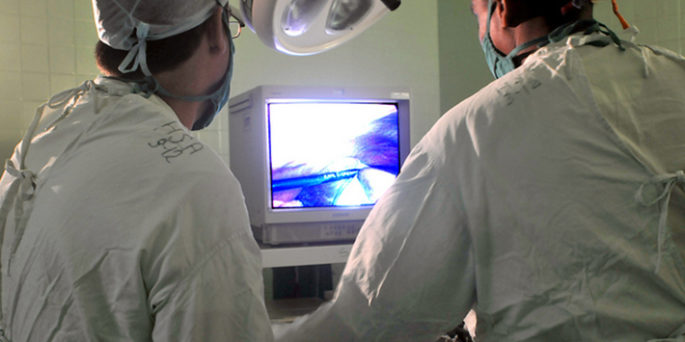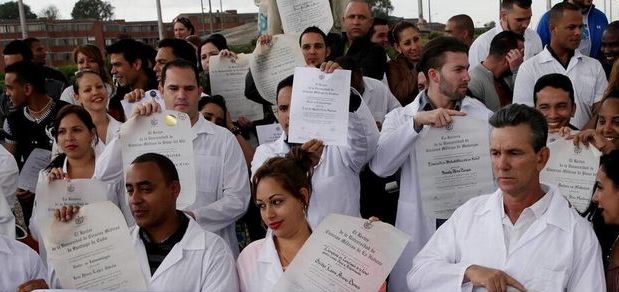
The doctors who don’t return to practice in Cuba
HAVANA — In March 2015, Dr. Alioth Guerrero received a scholarship to attend a congress in Colombia. Once there, he learned about the opportunities offered by other Latin American countries to study toward a doctoral degree. When he returned to Cuba, he talked about it with his professors and began to consider the idea more seriously. After discussing it with his family, he applied for a doctorate in Mexico. He won the doctorate and the scholarship.
“I tried to make it on the same speciality I was working on here, so that, once I finished, I could return and continue my work. That’s when all hell broke loose.” On Dec. 1, 2015, the Cuban government decided to again regulate the travel abroad of specialist doctors.
At that moment, the migratory policy announced in 2013 was still in effect. Nevertheless, for cardiologists, surgeons, nephrologists, pediatricians, gynecologists and others, the rules established by Decree 306 of 2012 began to apply.
Two months earlier, the Ministry of Public Health (MINSAP) had announced that it would allow all doctors living abroad to rejoin the National Health System, including those who had quit international missions. Although that measure remains in effect, Alioth will not abide by it.
“I’d be crazy to do it,” he says. “I applied again for a doctorate and would finish in 2020. If I rejoin the health system, I’d be regulated once again, and that’s very difficult to assimilate. If tomorrow they remove the regulation, I assure you that I’ll seek repatriation.”
He is 32 years old and has a son. After graduating, he became a general practitioner and later sought a specialty at the Cuban Center for Neuroscience. He was one of the 15 doctors specializing in neurophysiology that, according to the MINSAP’s Statistical Annual, lived in Cuba in 2015.
When doctors begin their studies, Alioth says, no one hands them a document where they can indicate their agreement (or disagreement) with the migratory rules they will have to obey after graduation.
Another doctor, a specialist in internal medicine, says that even if such a clause existed, he would have studied medicine just the same.
“That was always my dream,” he says. But he adds, “nobody explains to you that, once you’re in, you become a lamb of the government.” The internist was the top graduate in his class in 2009. Today, he lives in Colombia.
Don’t tell me the medics left

“When we began our career, we knew what we had before us, but things change and the people know how to deal with it,” the clinician says. “Increasingly, the students study and leave the country on the day they graduate.”
For talented people to look for better living and working conditions is nothing new or exclusive of Cubans. In 2007, developing countries in general lost between 10 percent and 30 percent of highly qualified personnel.
Latin America was the region that recorded the largest relative increase in qualified migration from 1990 to 2007, with a rise of 155 percent. In 2013, Mexico was the country that had the most highly qualified migrants in the OCDE (Organization for Economic Cooperation and Development), basically in the United States. In addition, Mexico in 2004 was the largest source of migrants in the world, followed by China and India.
What’s alarming in the case of Cuba is what has happened in recent years. The exodus of professionals has risen to 40 percent of the rosters in areas with highly qualified professionals, such as pharmaceutical and biotechnology groups.
Emith Núñez, a professor at Havana University with a master’s degree in economics, says that this is happening in almost all sectors. “The qualified workforce does not see in its wages a reflection of its years of study,” she says. Regarding the migratory regulation for specialists, she says: “That’s not a solution. The solution to the problem are the due incentives that must be generated to prevent the departure of this human capital in which the country has invested so much.”
To the Salvadoran specialist in international development and public policy Afife Khoury, “it is right for a person with talent to not be satisfied with poor wages and professional stagnation.” While she accepts that qualified migration is inevitable (to a degree), she also believes that “there are initiatives that governments can adopt so that this brain drain is not so harmful.”
“Otherwise, if the professionals are disparaged, if they’re not provided the necessary conditions to forge ahead, and instead their travel abroad is regulated, the situation may worsen.”
The idea is to prevent irreversible losses. For example, a solution such as the strengthening of networks of cooperation among scientists and professionals abroad can become a concrete opportunity to promote the return of knowledge and resources to the country of origin.
“At the end of the day, the problem does not lie with the citizens with specialized abilities,” Khoury says.”The problem is that they don’t have the adequate opportunities to practice such abilities.”
A clinician says that the authorities cut his wings, that they made it easy for him to leave. “If at the age of 27 I had become a specialist, I would have sought another specialty. I like to think, to use a scientific method. That’s why I chose this specialty, because it’s the most complete, the one with the rarest cases.”
Since he became a specialist in 2013, he practiced in the hospital where he had been a resident and where he was a professor. His superior, a general practitioner, told him one day “that I wasn’t there to do science, that I was there only as labor force. When I applied for and won the second specialty, she denied it to me because — according to her — it wasn’t in the best interest of the hospital. Believe me, she crushed me. I was very depressed.”
When the internist asked to retire in 2014, the new migratory policy was in effect and, because he left before Dec. 7, 2015, “I don’t have any problems leaving now; that’s why I don’t want my name to be published.”
“I’ll return when things change and us medics have the status we must have.”
The day the new regulations were announced, Alioth had spent more than 1,000 convertible pesos (CUC) in the legalization of documents and migratory paperwork. Many friends in similar situations urged him to leave early, as they planned to do. He decided to follow the procedures stated in the resolution. “I didn’t want to leave in a hurry, as if I were doing something illegal.”
When he asked for permission to travel, “I was told I wasn’t qualified to seek doctorates and scholarships on my own.” The course began and Alioth did not arrive in time to enroll.
Later, he was allowed to attend a Congress of Clinical Neurophysiology in Mexico, to which he had been invited with all expenses paid, but the MINSAP’s Department of International Relations told him he couldn’t travel with his regular passport.
Finally, when he received his official passport and visa, “I was forced to sign a document that said that if I didn’t return on the established date, I would be considered to be a defector. So, here I am. They turned me into a defector. I would have to be a masoquist to return.”
“With regard to the salary, what can I tell you?” Alioth continues. “I charged 1,538 ordinary pesos (CUP) and that went into diapers for my son.”
Since the wage raise in 2014, the highest wages are paid to second-grade specialists and doctors with two specialties: 1,600 CUP, from which a percentage is withheld as a contribution to Social Security. The Cuban economist Humberto Pérez says that, in order to cover basic necessities at current prices, doctors need at least 900 CUP.
When comparing Cuba’s economic indicators with those of any other country, the first thing to bear in mind is what another economist, Pedro Monreal, has described as “the mother of all of Cuba’s economic distortions” — the fact that, to the population, 1 CUC = 24 CUP, while, to the state’s legal persons 1 CUC = 1 CUP. The data in national accounts are based on “the illusion of an official rate of exchange” where 1 CUP = 1 CUC = 1 USD.
Knowing that the salary of a specialist C at the Guadalajara Civil Hospital was about 2,700 dollars a month in 2015, we might say that a specialist earns 1.7 times more in Mexico than in Cuba … if the illusion were real. Actually, a specialist in Mexico earns 40.5 times more than in Cuba.
That’s not all. A general practitioner in Chile earns twice as much as one in Mexico, while a doctor in Luxembourg earns almost five times as one in Chile. In the United States, a specialist bills 89,000 dollars more than a general practitioner. And because in countries with higher income the standard family basket is not proportionally more expensive, the purchasing power of doctors increases.
It is in this context that Alioth balances his books. “Every day I am more convinced that I made the right decision,” he says.
“Of course this affects us a lot, but there’s that damn dilemma again: How do I explain to a patient that we can’t do the operation we planned a month ago because there’s no specialist? And at the same time, how does the state explain to the specialist that he can’t leave [the country] to improve his profession or simply live abroad when [the state] cannot guarantee him the conditions to look after his children?”
Photo at top: Surgical unit at the Salvador Allende Hospital in Cerro, Havana / Rolando Moltanván Martínez.


